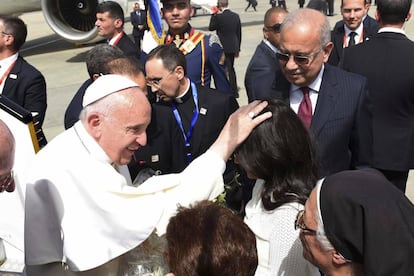Pope Francis hints at new mediation initiative in Venezuela
Opposition rebuffs pontiff’s suggestion it won’t talk to government because it is divided
Comments by Pope Francis over the weekend about the need for a solution to the ongoing political crisis in Venezuela have unsettled the opposition, which has called for another protest on Monday.

On Saturday, before leaving for Rome from Egypt, where he had made a two-day visit, Pope Francis said the Vatican was prepared to take part in a new effort to find a solution to the conflict in Venezuela, which has been hit by a month of anti-government protests that have left at least 29 people dead.
But the Pope referred to “clear conditions,” suggesting that one of the problems in mediating again was that the opposition was not prepared to talk to the government because it was “divided.”
Venezuela is in the midst of a worsening crisis, with basic goods increasingly scarce
On Sunday, the Pope mentioned Venezuela in the traditional Sunday prayers in Saint Peter’s Square. This time, presumably in a bid to appease Venezuela’s MUD opposition parties, he called on both sides to avoid violence, calling for “negotiated solutions” and respect for human rights in a country he described as “going through a serious humanitarian crisis.”
Pope Francis’s comment that the opposition is divided prompted a swift response on Saturday.
“Venezuelans are more united than ever over the demand for political change in the country, as are the different factions of the MUD,” said the coalition in a statement.
“The latest evidence of this is the recent manifesto signed by all political organizations,” it added. The opposition statement reiterated its demands for early presidential elections this year, along with polls at state and municipal levels. It also called for humanitarian aid to provide basic foodstuffs and medicines, the freeing of political prisoners and the demobilization of pro-government armed civilian groups, known as colectivos.
The Pope called on both sides to avoid violence, calling for “negotiated solutions”
The Pope’s comments were particularly significant in that he mentioned that the group of former heads of state and government that tried to mediate between October and December of last year, among them Spain’s José Luis Rodríguez Zapatero, are now working on a new process. “But things are still in the air,” added the Pope.
“We continue to receive dramatic news about the situation in Venezuela, with many dead, injured and arrested,” said Pope Francis on Sunday, adding: “While I share the pain of the families of the victims, to whom I offer my prayers, I send out a cordial call to the government and all in Venezuelan society to avoid new forms of violence.”
The Primero Justicia (First Justice) and Voluntad Popular (Popular Will) opposition parties have been directing most of the recent protests, arguing the need to keep up pressure on the government. Un Nuevo Tiempo (A New Time), also part of MUD, has not taken part in any marches over the last month, and is in favor of dialogue with the government of President Nicolás Maduro.
At the end of March, the government-controlled Supreme Court briefly stripped the National Assembly of its powers, returning them within a few days, but sparking new street protests over the last three weeks.
The opposition’s tactic of street protests has so far failed to bring about any change in Venezuela. In 2014, a wave of unrest swept the country, leaving more than 40 dead, though now many opposed to the government say they feel protesting is pointless.
Venezuela is in the throes of an unprecedented crisis that is hitting it from all sides: it has one of the highest inflation rates in the world, violence and crime are rampant, people are unable to find necessary everyday items, and the social fabric is breaking down.
The opposition says it intends to march on Monday through the center of the capital, Caracas, to the Supreme Court, the National Electoral Council and the Ombudsman’s office. Previous attempts to enter the center of the city over the last month have resulted in fierce clashes with the police.
English version by Nick Lyne.
Tu suscripción se está usando en otro dispositivo
¿Quieres añadir otro usuario a tu suscripción?
Si continúas leyendo en este dispositivo, no se podrá leer en el otro.
FlechaTu suscripción se está usando en otro dispositivo y solo puedes acceder a EL PAÍS desde un dispositivo a la vez.
Si quieres compartir tu cuenta, cambia tu suscripción a la modalidad Premium, así podrás añadir otro usuario. Cada uno accederá con su propia cuenta de email, lo que os permitirá personalizar vuestra experiencia en EL PAÍS.
¿Tienes una suscripción de empresa? Accede aquí para contratar más cuentas.
En el caso de no saber quién está usando tu cuenta, te recomendamos cambiar tu contraseña aquí.
Si decides continuar compartiendo tu cuenta, este mensaje se mostrará en tu dispositivo y en el de la otra persona que está usando tu cuenta de forma indefinida, afectando a tu experiencia de lectura. Puedes consultar aquí los términos y condiciones de la suscripción digital.








































